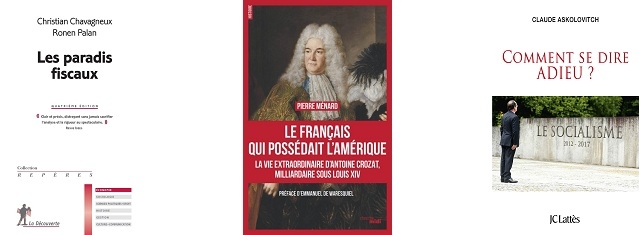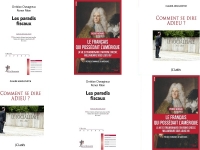Vips
THREE INTERESTING FRENCH BOOKS on this time of PRESIDENTIAL RACE
Upper Class, Middle Class, Lower Class

(Source: La Découverte - Cherche Midi - JC Lattès)
USPA NEWS -
Wealth is the abundance of valuable resources or valuable material possessions. The modern concept of wealth is of significance in all areas of economics, and clearly so for growth economics and development economics yet the meaning of wealth is context-dependent....
Wealth is the abundance of valuable resources or valuable material possessions. The modern concept of wealth is of significance in all areas of economics, and clearly so for growth economics and development economics yet the meaning of wealth is context-dependent. The United Nations definition of inclusive wealth is a monetary measure which includes the sum of natural, human, and physical assets. Upper class encompasses the top end of the income spectrum relative members of society as a whole. Since they have more wealth and privacy, the upper class has more personal autonomy than the rest of the population.
Upper class values include higher education, and for the wealthiest people the accumulation and maintenance of wealth, the maintenance of social networks and the power that accompanies such networks. Middle class encompasses the individuals who fall in between the upper and lower class relative to their financial situation. The middle class places a greater emphasis on income and measures success and potential in the form of money rather than influence and power. Those with the least amount of wealth are the poor. Most of the institutions that the poor encounter discourage any accumulation of assets. Lower class members feel more restrictive in their options due to their lack of wealth....
'LES PARADIS FISCAUX' (Tax Havens) by Christian CHAVAGNEUX & Ronen PALAN - La Découverte Editions. In this Book, the two Authors deal with this disturbing but very mediatized issue 'which is the Tax Heavens. It concerns as much as individuals as international corporates. Those tax havens are jurisdictions that offer favorable tax or other conditions to their taxpayers as relative to other jurisdictions. Individuals or corporate entities may establish shell subsidiaries or move themselves to areas with reduced or no taxation levels relative to typical international taxation. This creates a situation of tax competition among jurisdictions.
Different jurisdictions may be havens for different types of taxes, and for different categories of people or companies. The advantages of tax havens can be viewed in the following four principal contexts : Personal Residency, Corporate Residency, Asset Holding, Trading and other Business Activity. Much of the economic activity in tax havens today consists of professional financial services such as mutual funds, banking, life insurance and pensions. Bearer shares allow for anonymous ownership, and thus have been criticized for facilitating money laundering and tax evasion.
Most tax havens have a double monetary control system, which distinguish residents from non-resident as well as foreign currency from the domestic, the local currency one.... The Authors go through this very exciting and terrifying world in this book. The Tax Havens becoming globalisation's economic and financial key tools. Also, they became one of the elements that strengthen financial instability. The Authors go through the steps that have supported their emergence... (Review by Ruby BIRD)
'LE FRANCAIS QUI POSSEDAIT L'AMERIQUE - LA VIE EXTRAORDINAIRE d'Antoine CROZAT, Milliardaire sous LOUIS XIV' (The French Man who owned AMERICA - The extraordinary life of Antoine CROZAT, billionaire under LOUIS XIV) by Pierre MENARD (Cherche-Midi Editions). This Book goes through the life of Antoine Crozat, maMrquis du Châtel, who was the French founder of an immense fortune and was the first proprietary owner of French Louisiana, from 1712 to 1717. Born in Toulouse, France, the sons of modest merchants, he and his brother, Pierre, rose from obscurity to become two of the wealthiest merchants of France.
He became a financial counselor to Louis XIV. He invested in the Guinea Company and the Asiento Company, two lucrative overseas franchises. The king eventually offered him a 15“‘year trade monopoly in Louisiana. Raising the position of the King to a dignity and prestige hitherto unknown in France, Louis XIV made France the first power in Europe and his court at Versailles
the cynosure of Europe. But his many wars undermined French finances, and his persecution of the Huguenots (the Edict of Nantes was revoked in 1685) caused serious harm to the economy as thousands of merchants and skilled workers left France. The reign of Louis XIV saw the height of French power in America.
the cynosure of Europe. But his many wars undermined French finances, and his persecution of the Huguenots (the Edict of Nantes was revoked in 1685) caused serious harm to the economy as thousands of merchants and skilled workers left France. The reign of Louis XIV saw the height of French power in America.
The fate of Louisiana was bound to the French economy during the last years of the reign of Louis XIV. In an effort to instill vitality into Louisiana, King Louis XIV granted a proprietary charter on September 14, 1712, to the merchant and nobleman, Antoine Crozat. The royal charter afforded Crozat exclusive control over all trading and commercial privileges within the colony for a 15-year period. Crozat gained a monopoly over all foreign and domestic trade, the right to appoint all local officials, permission to work all mines, title to all unoccupied lands, control over agricultural production and manufacture, and sole authority over the African slave trade.
Crozat's failure to turn Louisiana to his financial advantage once more made the colony a ward of the crown. In 1717 the Regent of France, Philippe, duke of Orléans, fearing that the province would again drain his country's already bankrupt treasury, placed its fortunes into the hands of John Law, a Scottish investment banker.... Pierre MENARD gives a Big Picture of Antoine CROZAT going through his involvment in financing wars, participating to the annexion of Mauricius, dugging the channel of Picardy, inspiring the Law System before contributing to his downfall... (Review by Ruby BIRD)
'COMMENT SE DIRE ADIEU ?' (How to say Bye ?) by Claude ASKOLOVITCH - JC Lattès Editions. The Author is an award-winning French journalist and author. He is the author of several books. He won the 1999 Prix Décembre for 'Voyage au bout de la France: Le Front National tel qu'il est'. He leaves 'Le Point' in 2012 on a divergence of views (according to him) with the Newspaper, on the treatment of Islam in France. He would have been considered as 'islamophile' (in favor of Islam) when the Newpaper was publishing 'L'Islam sans gêne' (Islam without embarrassment).
This current Book is focussing on François HOLLANDE ( the actual French President) and Socialist Party or Socialism. 'In a country devastated by rancour and tempted by fascism, Socialists have governed. They gave up the ideological weapons and gave the power to the police to contain the challenges and defend the sacred order... They mobilized without truce or remorse around the pain of the attacks and the martyrs of our history, giving home to their emptiness in commemoration... In my country of FRANCE, socialism, which is my country, went at the end of its history, from helplessness to betrayals...', he said. The Book gives us all the deception of a believer (Review by Ruby BIRD)
Ruby Bird Yasmina Beddou Cherche Midi Jc Lattes Ladecouverte Socialisme President Les Paradis Fiscaux Pierre Menard Claude Askolovitch Christian Chavagneux Ronen Palan
Liability for this article lies with the author, who also holds the copyright. Editorial content from USPA may be quoted on other websites as long as the quote comprises no more than 5% of the entire text, is marked as such and the source is named (via hyperlink).






